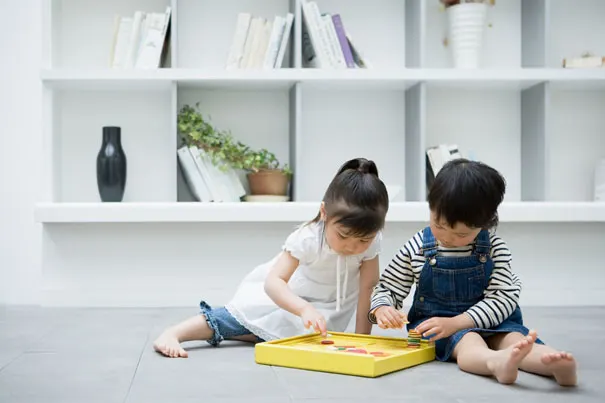Teaching Toddlers to Share
I know a sweet, delightful three-year-old who is very generous for her age...unless one of the other kids in her play group wants to play with the kitchen set. She's been known to throw herself bodily across the play kitchen just to keep another child from playing with it.
A Matter of Perspective
Why would this sweet child act this way? Actually, her behavior simply marks her as a normal three-year-old. It doesn't necessarily mean she's selfish or insensitive – her thinking may not be sophisticated enough to put herself in the place of another child who wants to play with her toys.
Here Are Some Things That You Can Do To Make it Easier:
1. Be a good model. Try to make sure that you set a good example of yourself. Let your child see you sharing with your spouse, children, and others. And be sure to mention these instances of sharing to your child, to make sure she realizes they're happening.
2. Praise good behavior. Similarly, stay on the lookout for times when your child shares something with someone else – whether it's with another child, an adult, or even you. Compliment your child when she's being a "good sharer." That will make her more likely to share again in the future, too.
3. Provide plenty of play dates. Play dates offer terrific opportunities for children to practice social skills in settings that their parents can supervise and even guide a bit when necessary.
4. Have something for everyone. Most sharing problems occur when two kids want to use the same toy at the same time. So one easy way to avoid a conflict is to let each child play with an identical toy ("Here, let's give you five blocks to build with, and we'll give Kelly five blocks too").
5. Practice taking turns. Below the age of about three or four, children usually spend a lot of their playing time in "parallel play" (playing separate games near each other, rather than playing together). However, it means that if you try to settle a conflict over a toy by suggesting that a pair of two-year-olds play with it together, you'll probably be disappointed.
6. Be prepared. Some toys are simply too special to share, either because they're new or because your child loves them too much. So, shortly before you host a play date at your home, take a moment to talk to your child about it. Ask your child to think about whether there are any toys that she doesn't want to share with his friend. If so, put those toys away someplace where they'll be safe and untouched until after the play date is over.
7. Be realistic. Set goals for your child, but make sure your expectations are realistic. With a little patience, some well-timed support and a whole lot of love, it won't be long before your child builds a foundation of skills that she'll use throughout his life.
Join Pampers Club and get:




